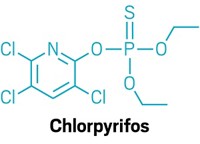Advertisement
Grab your lab coat. Let's get started
Welcome!
Welcome!
Create an account below to get 6 C&EN articles per month, receive newsletters and more - all free.
It seems this is your first time logging in online. Please enter the following information to continue.
As an ACS member you automatically get access to this site. All we need is few more details to create your reading experience.
Not you? Sign in with a different account.
Not you? Sign in with a different account.
ERROR 1
ERROR 1
ERROR 2
ERROR 2
ERROR 2
ERROR 2
ERROR 2
Password and Confirm password must match.
If you have an ACS member number, please enter it here so we can link this account to your membership. (optional)
ERROR 2
ACS values your privacy. By submitting your information, you are gaining access to C&EN and subscribing to our weekly newsletter. We use the information you provide to make your reading experience better, and we will never sell your data to third party members.
Pesticides
RNAi pesticide moves closer to US approval
EPA proposes to register biopesticide for 3 years to control Colorado potato beetle
by Britt E. Erickson
October 4, 2023
| A version of this story appeared in
Volume 101, Issue 33

Potato growers could soon have a new tool for combating the dreaded Colorado potato beetle, which is ubiquitous across the US and quickly develops resistance to chemical insecticides. The Environmental Protection Agency is proposing to allow a new type of biopesticide that relies on RNA interference (RNAi) for a limited period of 3 years on potato crops.
The pesticide’s active ingredient, called ledprona, consists of double-stranded RNA (dsRNA). The Colorado potato beetle is highly susceptible to dsRNA, which works by silencing a gene the beetle needs to produce a key protein. With the gene turned off, the insect stops eating and dies from metabolic toxins.
GreenLight Biosciences, the Massachusetts-based biotech firm that makes the biopesticide, plans to market it as a sprayable product under the brand name Calantha. Unlike many chemical pesticides, the product degrades quickly in the environment. It is also specific to the Colorado potato beetle, so no other insects are harmed, the company claims.
The EPA approved an experimental use permit in May to test the insecticide in 10 states. That permit requires GreenLight to notify the EPA of any safety concerns to human health or the environment that arise from the experimental uses. So far, no safety concerns have been reported, the EPA says in a Sept. 29 notice announcing the proposal.
If the EPA finalizes the proposal, Calantha would be the world’s first sprayable dsRNA pesticide allowed for commercial use on crops. The agency is accepting public comments until Oct. 13.





Join the conversation
Contact the reporter
Submit a Letter to the Editor for publication
Engage with us on Twitter